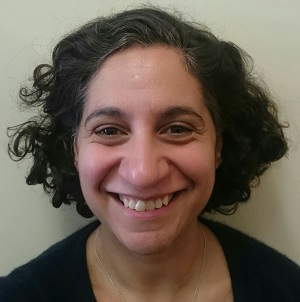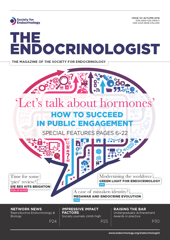Commissioned as a joint venture between the Association of British Clinical Diabetologists (ABCD), Diabetes UK, the Society for Endocrinology and the Royal College of Physicians (RCP), the annual workforce survey, in its current form, aims to find out where the nation’s diabetes and endocrine consultants work and the type of job plan they have. At the age of 13 (and probably a little later than its human teenage contemporaries), the survey is about to enter the world of the internet and go online!
PEN AND PAPER
'The results can be used as leverage to commission further services if needed, and the societies can use the data to lobby for improvement of provision'
Currently, an annual paper survey is sent to all identified consultants, asking some basic demographic questions, a few details about their job plan, and also if any new colleagues have joined their department in the previous year. This has, in theory, allowed us to track new appointees and any consultants that have moved Trusts. These new consultants are subsequently sent questionnaires asking them about their roles.
There have been workforce surveys for many years reporting to Diabetes UK (or the British Diabetic Association as it was then), but the first survey report to the four societies was produced by Dr Nick Morrish, who was succeeded by Dr Dinesh Nagi some years later. I took over the survey last year, producing my first report from the 2015 returns. Reports are filed annually and are available on all the sponsoring societies’ websites as well as being presented at the Diabetes UK annual professional conference and one of the two ABCD meetings held every year.
INEVITABLE SHORTCOMINGS
As with all surveys, returns are suboptimal and the information provided is not always complete, which has led to the need to triangulate the data with other sources, such as the RCP workforce survey, the Joint Royal Colleges of Physicians Training Board (JRCPTB) and the BMJ and NHS job adverts. This is a hugely time consuming task, so far carried out manually, and (having done it once) my admiration goes to both my predecessors and their assistants who have done this for years!
IMPORTANT STRENGTHS
Although sometimes incomplete, the information that has been gleaned through this survey has been invaluable. It allows us to see whether the provision of consultants is adequate or, indeed, inadequate at the level of full time equivalents (FTEs) of consultants. We can see region by region where the numbers fall below recommended levels per head of population.
An example of the type of information available in the report is shown in the Table. This has been generated with data from the RCP, showing the number of consultants per region.
The results can be used as leverage to commission further services if needed, and the societies can use the data to lobby for improvement of provision. It allows us to track the ages of the consultant body and predict retirements to a certain extent. In addition, with new posts created, we can provide trainees with information about their future job prospects.
Number of consultants per region using RCP dta from 2014. LETB, local education training board; FTE, full-time equivalent. Credit: RCP Workforce Unit
| LETB or region |
No. of consultants |
No. of FTEs |
Population per FTE |
FTEs per 100,000 population |
| Yorkshire and the Humber LETB |
76 |
75.1 |
70,217 |
1.42 |
| West Midlands LETB |
79 |
78.3 |
72,939 |
1.32 |
| Wessex LETB |
28 |
26.9 |
118,370 |
0.84 |
| Wales |
41 |
40.0 |
77,386 |
1.29 |
| Thames Valley LETB |
21 |
20.6 |
113,538 |
0.88 |
| South West LETB |
52 |
49.5 |
87,247 |
1.14 |
| South London LETB |
49 |
47.9 |
66,673 |
1.49 |
| Scotland LETB |
96 |
93.6 |
57,135 |
1.75 |
| Northern LETB |
38 |
37.6 |
78,321 |
1.27 |
| Northern Ireland |
22 |
22.0 |
83,756 |
1.19 |
| North West London LETB |
36 |
35.6 |
57,182 |
1.75 |
| North West LETB |
92 |
90.8 |
75,955 |
1.31 |
| North East & Central London LETB |
54 |
52.6 |
62.941 |
1.59 |
| Kent, Surrey and Sussex LETB |
40 |
39.0 |
114,280 |
0.87 |
| Jersey |
1 |
1.0 |
99,500 |
1.01 |
| East of England LETB |
65 |
63.1 |
95,308 |
1.04 |
| East Midlands LETB |
43 |
41.7 |
111,291 |
0.89 |
| Grand total/average |
833 |
815.2 |
79,445 |
1.16 |
THE DAWN OF THE DIGITAL ERA
'We hope that we will be able to look at subspeciality intersts, community and academic work, and all the other work that our specialty does without, it seems, much recognition'
My ambition upon taking on the survey was to transfer it to the digital age and so its transition has begun. This will allow the data collection to become easier, and hopefully more accurate.
After assessing several options and seeking agreement from the commissioning societies, it has been agreed that data collection will be performed using the existing infrastructure available at the RCP workforce unit. This will allow the very quick transfer of the survey onto an online platform.
It gives us the opportunity to revisit the questions that are asked, to extend the scope of the survey to allow us to interrogate the data more closely, and to provide reports with more granularity. We hope that we will be able to look at subspecialty interests, community and academic work, and all the other work that our specialty does without, it seems, much recognition. It will allow some of the demographic data to come pre-filled, saving time for respondents. Selfishly, it will hopefully make the process of analysis much easier for me and my successors!
We also hope that, by modernising the survey and making it easier to respond, we will get a much higher response rate than we have thus far.
We are currently finalising the questions and the survey should be pinging into an inbox near you by the end of the year! Please do take the time to complete it, and I hope next year’s report will make interesting reading for you all.
Stella George
RCP/ABCD/SfE/DUK Workforce Co-ordinator and Consultant in Diabetes and Endocrinology, East & North Hertfordshire NHS Trust
Twitter: @svdmdoc






